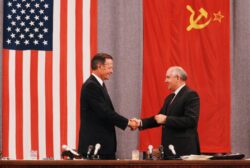An excerpt from “NATO Expansion: Costs and Implications” a presentation by Carl Conetta, Project on Defense Alternatives, to the International Network of Engineers and Scientists for Global Responsibility, July 23, 1998.

Also affecting the American decision to press for expansion were developments in Russia during and after 1993: the attempted “second coup” and assault on parliament, the electoral victories by Communists and nationalists, the war in Chechnya, and US-Russian disputes over Bosnia. These left few American officials confident that Russia would evolve into a truly reliable and stable ally — at least, not on its own. And if one thread has linked both the Bush and Clinton policies toward Russia it has been the decision to leave Russia “on its own,” twisting in the wind. Both administrations voiced high hopes for post-Communist Russia, while doing very little materially to aid Russian stability and democratic transition.
Nonetheless, the Clinton team did not conceive and pursue NATO expansion as an anti-Russian maneuver. It was not fear of Russia’s potential strength that gripped them, but recognition of Russia’s current weakness. Put simply: The Clinton administration knew that there was little Russia could do about expansion. Yes, that condition may change — given 15 or 20 years — but by then, the Administration hopes, Russia will have accepted the new strategic landscape. And if it has not, and a new cold war ensues, at least the West will be in a much better position strategically than it was during the first go around.
For other pro-expansion advocates, represented by the Republican leadership in Congress, anti-Russian sentiments are central. In this there may be an element of “settling scores” and also the notion, espoused by Henry Kissinger and Zbigniew Brzezinski, that Russia is somehow culturally programmed for expansion. At any rate, this part of the policy bloc tends to favor accelerating NATO outreach to the Baltic states and possibly the Ukraine. But they will not pay even lip-service to the idea of eventually including Russia too.
One sentiment shared across the spectrum of expansion advocates is that Russia has no legitimate reason to be concerned about NATO expansion. Strobe Talbot, who should know better, says Russian opposition to NATO “will only intensify the darkest suspicions about Russia’s intentions and future.” Senate Republican leader Trent Lott echoes these sentiments: “Whether Russia is ready to accept an enlarged NATO will be an important sign of Russia’s departure from its imperial past.” For them, Russian opposition to NATO is itself an argument for expansion. From this perspective there are no legitimate Russian concerns.
This remarkable assertion asks us to set aside all that history teaches about the behavior of states and the workings of power. We might begin to understand Russia’s concerns by asking “What is NATO?” Edward Luttwak, an American strategic analyst, answers that “NATO is not a security-talking shop but a veritable military force…temporarily at peace.” NATO offers its members participation in not only an alliance but a unified military command whose primary mission is to prepare for war on a continental scale. Even today, after significant reductions, NATO’s members together boast military power several times as great as that demonstrated (but underutilized) in the Gulf War.
It is the stock in trade of military professionals to look first at strategic capabilities and trends, rather than declarations of intent. So it should not surprise anyone that the creep of a great and exclusive military organization toward Russia’s borders is of concern to the Russian military. It would also seem unavoidable that any Russian politician hoping to keep his or her position would express concern. This concern need not focus principally on the unlikely prospect that NATO might someday take an aggressive turn. More to the point is the effect military power has on politics every day. Nations routinely have differences of interest and perspective. The settlement of these differences need not involve conflict but they always involve calculations of power and position. NATO expansion diminishes Russia politically and does so at a time when Russia is already weakened, fairly accommodating, and facing great instability at home and on its southern borders. Moreover, third parties are watching, and some of these directly and immediately engage important Russian interests.
Russia is naturally concerned about the tens of millions of Russians living outside Russia as minorities in other former-Soviet republics. These republics are sensitive to Russia’s concern — but how will the image and reality of an expanding NATO affect their behavior? For that matter, how will the march of NATO affect the calculations of separatist forces within Russia?
Another concern: The former-Soviet republics seemed able to divide the assets and resources of the Soviet Union with relatively little acrimony — partly because they have continued to function cooperatively in the economic realm. This division — the question of who should get what — takes on an entirely different valence if some republics, but not others, move into an exclusive economic and military bloc.
To limit these concerns Russia has and will continue to take steps to improve its European military posture — but these steps can only take away from defense efforts on its southern flank, where even border control poses a daunting challenge. So NATO expansion effectively squeezes Russia between a rock and a hard place. Most damaging to relations between Russia and NATO is the fact that what has inspired NATO expansion is not necessity, but opportunity. NATO is expanding not because it must, but because it can.
